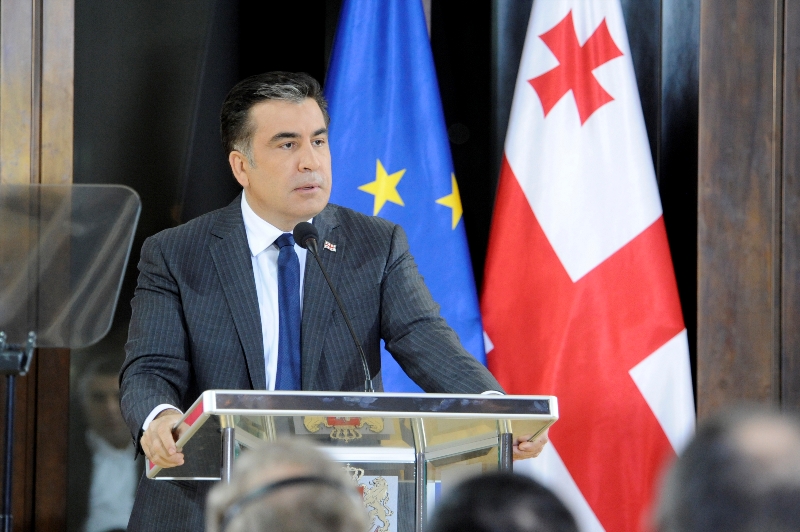The culture of democracy in Georgia requires serious repair. Despite groundbreaking reforms over nearly a decade, and the freest and fairest election in the country’s history last October, mob violence recently made a near-comeback as Georgia’s primary tool of political change.
Georgia, a country the size of Austria that is strategically nestled in the turbulent South Caucasus region between Russia, Turkey, the Black Sea, Armenia, and Azerbaijan, was invaded by Russia in August 2008. Russia’s military operation was punishment for Georgia’s attempt to quell a rebellion (encouraged by Moscow) in Georgia’s separatist region of South Oesstia. Russia still occupies 20 percent of Georgia, including the region of Abkhazia, which directly abuts the winter resort at Krasnaya Polyana, where Alpine skiers will compete in next year’s Sochi Olympics unaware of the military aggression just across a neighboring ridge. Moscow has viewed Georgia’s dramatic democratic and market economic reforms, along with its quest to join NATO under pro-Western President Mikheil Saakashvili as a threat to its regional hegemony.
Notwithstanding the brief war and Russia’s continuing occupation, Georgia has continued to thrive as a democracy, at least until February 8, when violent protestors tried to prevent the country’s democratically elected president from delivering his annual state of the nation address and demanded that he step down. The unruly crowd reportedly beat President Saakashvili’s supporters, dazing and bloodying the face of Chiora Taktakishvili, a campaign spokeswoman for the president. At the heart of the melee was the refusal of Georgia’s ruling coalition, which controls the government and legislature but not the presidency, to permit President Saakashvili to deliver his annual speech to the Georgian nation in parliament unless he relinquished his constitutional right to dissolve parliament and the government. Saakashvili rejected this attempted political blackmail, and decided to deliver his speech not in parliament but at the Georgian National Library, where the violence ensued.
This spectacle took place against the backdrop of political tension that has been brewing since last October, when a broad coalition known as the Georgian Dream, centered on billionaire and first-time politician Bidzina Ivanishvili, surprised many observers by defeating Saakashvili’s ruling United National Movement. Previously, parliamentary elections were of secondary importance in Georgia, where the power to form and run the government lay with the president. But, in 2012, President Saakashvili convinced parliament to amend Georgia’s constitution to transfer decisive political power from the president to the prime minster. Many of Mr. Ivanishvili’s supporters cried foul, worrying that Saakashvili was preparing a soft landing for himself at the helm of Georgian politics when his presidential term expired in late 2013. Meanwhile, many supporters of Mr. Saakashvili worried that Mr. Ivanishvili planned to reorient Georgia toward Russia, (where he earned a fortune equaling half of Georgia’s GDP), and away from Georgia’s march toward the Euro-Atlantic community that Saakashvili champions and Moscow loathes.
Mr. Ivanishvili and his Georgian Dream won the October 2012 parliamentary election decisively. President Saakashvili immediately recognized this result, to the surprise of his critics. Saakashvili did not exercise the authority he retained to dismiss Georgia’s government and parliament, but instead called for a “cohabitation” government between his party and Prime Minister Ivanishvili’s coalition. Many of us in the international community cheered this outcome, as the Georgian people and their political leaders seemed to have cleared the way for Georgia’s first democratic transition.
But, those democratic gains are now under threat. After dismissing Saakashvili’s bid for political cooperation, Prime Minister Ivanishvili and his legislative allies escalated tension by blocking the president’s right to address the nation unless Saakashvili relinquished his core constitutional powers as head of state. This constitutional tug-of-war culminated in the violent attack of February 8 on Saakashvili’s supporters.
Violence was anathema to those who participated in the Rose Revolution of November 2003, which toppled the post-Communist regime of then-President Eduard Shevardnadze through two weeks of peaceful protests of a fraudulent parliamentary election. As the member of the White House’s National Security Council Staff with responsibility for US-Georgia relations, I witnessed how Saakashvili and many of his erstwhile allies who now oppose him avoided violence even when infuriated by a stolen election, and how then-President Shevardnadze restrained his security forces. This commitment to non-violence marked a human triumph of the Rose Revolution and set a hopeful precedent for peaceful political transitions in defense of democracy in the post-Soviet space. February 8th’s violence in Tbilisi’s streets betrayed these universal values.
Perhaps even more worrisome than the violence was the demand of the ruling coalition’s parliamentary majority that Georgia’s president surrender key constitutional powers in exchange for his democratic right — and duty — to address the Georgian nation. Democracy is absent when the right of free speech is treated as a commodity to be bartered away, especially when such a trade would weaken a fledgling democracy’s system of checks and balances.
For Americans, the thought that our president’s State of the Union address could be blocked by Congress is incomprehensible. And, there is no reason why the Georgian people should not enjoy these same democratic expectations. Hopefully, the shock of this recent street violence, which Prime Minister Ivanishvili condemned, will rattle Georgian voters enough to get democracy back on track by electing a president this October who is committed to the civilized and democratic values that are the legacy of the Rose Revolution. Europe and the United States can help by embracing those top officials in Mr. Ivanishvili’s coalition who make clear that Georgia’s real dream is not humiliation of their country’s elected president, but full integration into the Euro-Atlantic community of democracies.
Matthew Bryza is senior fellow with the Council’s Patriciu Eurasia Center, former US ambassador to Azerbaijan, and current director of the International Centre for Defense Studies in Tallinn, Estonia.
Photo credit: president.gov.ge
Image: saakashvilistateofnation.jpg
